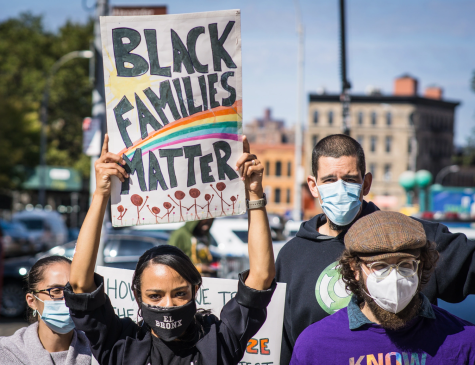Reasoning with people against vaccines doesn’t work
March 13, 2014
The growing threat of unvaccinated children is creating death babies. No but seriously friends, if you don’t vaccinate your infants, Junior will kill all the grandparents whose elderly immune systems cannot fight back the horrific diseases we nearly banished from the earth before Jenny McCarthy told you vaccinations cause autism.
Seriously, also, that is how this all started: Jenny McCarthy, with a little gravitas from her ex-boyfriend Jim Carrey, managed to blow a small, dedicated, and dangerously wrongheaded group into the mainstream.
These two actors may succeed in destroying what is arguably the greatest accomplishment in medical history, which has allowed us to tame horrible diseases. I say tame because viral infections still have no cures; immunity can protect us from becoming infected, but once we are, options become very limited.
According to the California Immunization Coalition, when the immunization rate reaches 80-94 percent those most vulnerable to die of infection, such as the sick, elderly, pregnant, as well as infants and those with compromised immune systems, are protected.
This is called community or herd immunity. There are enough people in the community who can’t carry the disease that it can’t spread to these most vulnerable groups.
So if you don’t vaccinate your children, they may kill your grandparents. And the possibility of epidemic infection is closer than many of us think.
According to the San Francisco Chronicle an unimmunized man actively infected with measles rode BART for several days a few weeks ago, potentially exposing hundreds of thousands of people to the virus. The Daily Californian reported last week that he spread the disease to two of his family members.
The risk that a single such incident could lead to widespread infection grows with every unvaccinated person. And as children of anti-vaxxers grow up, they will only become more globally mobile.
Our blissful ignorance of these diseases is becoming our curse; we cannot imagine what would happen if a deadly fever, cough, or pox swept through our neighborhood and the doctors had no medicine.
The only way to shield the most vulnerable is also the only way to protect ourselves; remove the virus from our environment entirely. Our only hope is nearly universal rates of vaccination giving us community immunity to these diseases.
If you don’t intend to vaccinate your children, you probably haven’t gotten this far. If you have, I applaud your open mindedness. Be honest with me for a moment, though. You haven’t changed your mind, have you?
I’m not saying anything about you, personally or as a person. I’m going off a survey by pro-vaccination group Women Thinking, Inc. and The James Randi Education Foundation. The JREF describes itself as focused on “reaching out to the public and media with reliable information about paranormal and supernatural ideas.” The survey found rational arguments not only fail to change the minds of anti-vax parents, some actually push parents to decide against vaccination.
If you were hoping to shove this commentary in the face of your neighborhood anti-vaxxer and watch them writhe, this is painfully disappointing. I know—I’m the one who just wrote an awesome commentary convincing people to save their children, our children, and possibly all of us, by ripping on them. Turns out, this is at the very best a wasted effort.
I have an Autism Spectrum Disorder, so I’ve got some extra skin in this game. That parents are so terrified of their children being like me that they’d rather watch them die is—well, mildly disappointing. Talking about that is exactly the kind of thing that backs your opponent into a mental corner and makes them less likely to change their mind.
Evidence, for which see above, is even worse, because we tend to accept evidence we agree with at face value while retaining skeptical evidence we disagree with, regardless of the objective value of the evidence. This was first demonstrated in the Journal of Personality and Social Psychology in 1979, in a famous experiment by researchers at Stanford.
This experiment, and many variations since, explains how you can meet someone who legitimately believes that Jenny McCarthy is a better source of medical information than the Center for Disease Control.
But talking to an anti-vaxxer is not entirely hopeless. Women Thinking, Inc. suggests a surprisingly simple key to this lock of resistance: positivity. Instead of forming an argument, simply stating your intent to vaccinate, or explaining your decision to vaccinate, in positive terms can positively influence others.
Reframing the debate as an active choice that parents are opting into, like putting their baby in a car seat, helps parents see vaccination as what it is: a form of lifesaving protection carrying little risk. If ignoring the recommended immunization schedule seems like putting your baby into a car without a car seat, a message has been conveyed. If someone wants to debate that point, rather than giving fuel to the fire of his argument you can make a positive statement like “I want to do everything I can to keep this little guy safe.”
It’s much more fun to viciously eviscerate someone than it is to nod and say something positively pleasant. But those of us who think that we are clever and well read and on the right side of an issue are too often unconvincing.
Vaccination is one of the many issues facing us today that are literally life and death, and we need to start thinking about how to change peoples’ minds, not win arguments. Our grandchildren won’t care who was right when they’re all dead.














